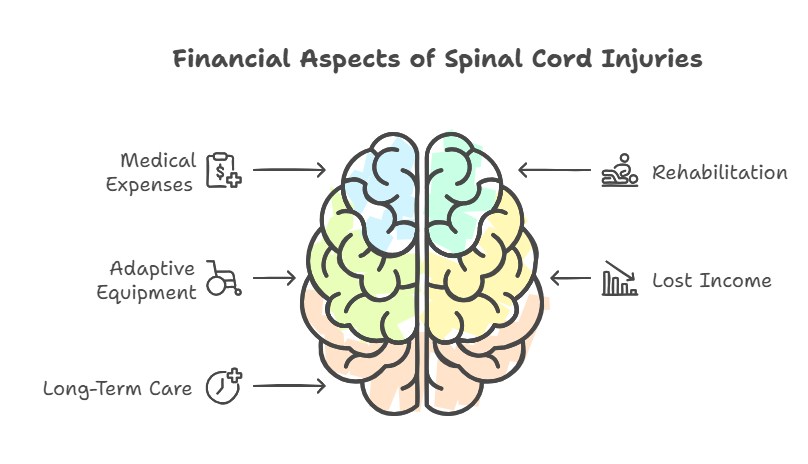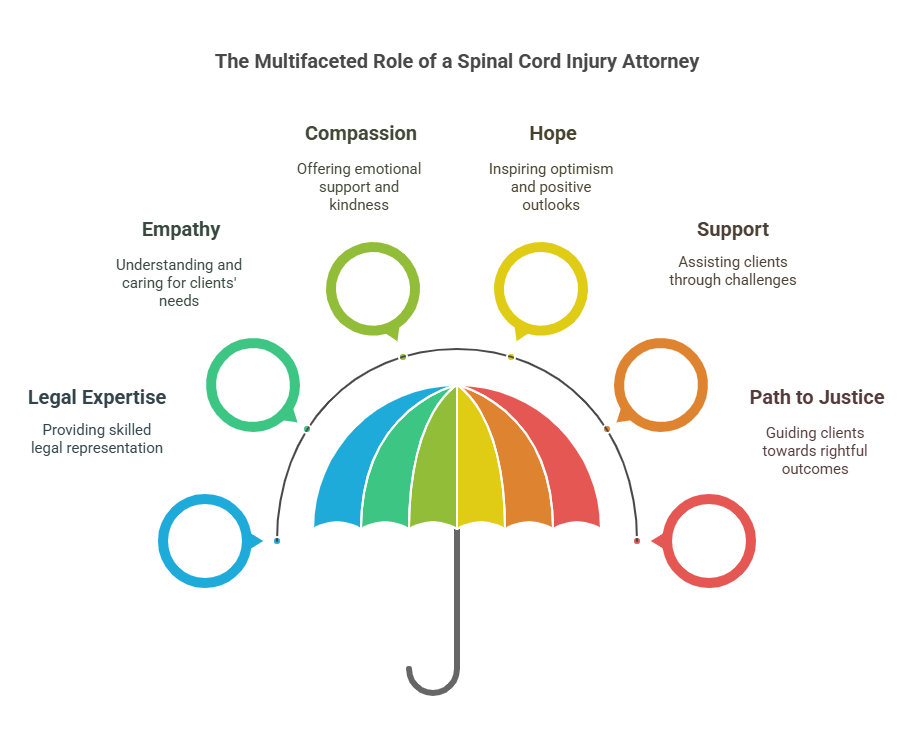Spinal cord injuries (SCIs) are among the most devastating and life-altering events a person can experience. They not only affect the individual physically but also ripple through every aspect of their life—emotional, financial, and social. In the face of such profound challenges, a spinal cord injury attorney becomes more than just a legal professional; they transform into a beacon of hope, a source of strength, and a compassionate guide. This article delves deeply into the role of a spinal cord injury attorney, exploring how they humanize the legal process and provide invaluable support to those navigating the aftermath of an SCI.
Understanding Spinal Cord Injuries: A Life-Changing Reality
A spinal cord injury occurs when damage to the spinal cord results in a loss of function, such as mobility or sensation. This damage can be caused by traumatic events like car accidents, falls, sports injuries, or acts of violence, as well as non-traumatic causes such as infections or tumors. The severity of the injury depends on its location and extent, with outcomes ranging from partial paralysis to complete quadriplegia.
The impact of an SCI extends far beyond the physical. Survivors often face:
- Emotional Trauma: Depression, anxiety, and a sense of loss are common as individuals adjust to their new reality.
- Financial Strain: The cost of medical care, rehabilitation, and adaptive equipment can be overwhelming.
- Social Challenges: Relationships may change, and individuals may struggle with feelings of isolation or dependence.
In this context, a spinal cord injury attorney steps in not only to secure financial compensation but also to provide a sense of stability and hope during an uncertain time.
The Humanized Approach of a Spinal Cord Injury Attorney
What sets a spinal cord injury attorney apart is their ability to blend legal expertise with genuine empathy. They understand that their clients are not just case numbers—they are people with unique stories, struggles, and dreams. Here’s how they humanize their role:
1. Building Trust Through Active Listening
The foundation of any attorney-client relationship is trust. A compassionate attorney takes the time to listen to their client’s story, understanding not only the facts of the case but also the emotional and psychological toll of the injury. This deep listening helps the attorney tailor their approach to meet the client’s specific needs and goals.
2. Providing Emotional Support and Reassurance
Dealing with a spinal cord injury can be isolating and overwhelming. A skilled attorney recognizes this and offers emotional support, helping clients feel heard and valued. They provide reassurance that they are not alone in this journey and that someone is fighting tirelessly on their behalf.
3. Connecting Clients with Resources
Beyond legal representation, a spinal cord injury attorney often serves as a bridge to essential resources. They may connect clients with:
- Medical professionals specializing in SCI care
- Rehabilitation centers and physical therapists
- Support groups for SCI survivors and their families
- Financial planners to help manage compensation
This holistic approach ensures that clients have access to the tools and support they need to rebuild their lives.
4. Advocating for Justice with Integrity
Spinal cord injury cases often involve battling powerful entities such as insurance companies, corporations, or negligent parties. A dedicated attorney stands firm in their commitment to justice, ensuring that their client’s voice is heard and their rights are protected. They fight not only for financial compensation but also for accountability and systemic change.
5. Educating and Empowering Clients
The legal process can be daunting, especially for someone dealing with the physical and emotional challenges of an SCI. A compassionate attorney takes the time to explain the legal process in clear, accessible terms, empowering their clients to make informed decisions. They ensure that clients feel in control of their case and their future.
The Importance of Compensation in SCI Cases
Securing fair compensation is critical for individuals with spinal cord injuries. The costs associated with SCIs are staggering and often include:
- Medical Expenses: Surgeries, hospital stays, medications, and ongoing treatments.
- Rehabilitation: Physical therapy, occupational therapy, and psychological counseling.
- Adaptive Equipment: Wheelchairs, mobility aids, and home modifications.
- Lost Income: Reduced earning capacity and the inability to return to work.
- Long-Term Care: Assistance with daily activities and specialized care.
A spinal cord injury attorney works tirelessly to ensure that their client’s financial needs are met, providing a sense of security and stability during an uncertain time.

The Challenges of Proving Negligence in SCI Cases
Spinal cord injury cases often hinge on proving negligence—that another party’s actions or inactions caused the injury. This requires a thorough investigation and the ability to present compelling evidence. A skilled attorney will:
- Gather accident reports, medical records, and witness statements.
- Consult with medical experts to establish the cause and extent of the injury.
- Use technology such as accident reconstruction to demonstrate how the injury occurred.
- Negotiate with insurance companies or present the case in court if necessary.
This meticulous approach ensures that the client’s story is told effectively and that justice is served.
Choosing the Right Spinal Cord Injury Attorney
When selecting an attorney, it’s essential to choose someone who combines legal expertise with genuine compassion. Look for an attorney who:
- Has a proven track record in handling SCI cases.
- Demonstrates a deep understanding of the challenges faced by SCI survivors.
- Communicates openly and honestly.
- Prioritizes your well-being and best interests.
Conclusion: More Than Just Legal Representation
A spinal cord injury attorney is more than just a legal professional—they are a lifeline for individuals and families navigating one of the most challenging experiences of their lives. By blending legal skill with empathy and compassion, they provide more than just representation; they offer hope, support, and a path toward justice.
If you or a loved one is dealing with the aftermath of a spinal cord injury, remember that you don’t have to face it alone. A dedicated attorney is ready to stand by your side, fighting for your rights and your future. In the end, it’s not just about winning a case—it’s about restoring dignity, securing peace of mind, and helping clients move forward with confidence and resilience.

Frequently Asked Questions (FAQs) About Spinal Cord Injury Attorneys
Navigating the legal landscape after a spinal cord injury can be overwhelming. To help you better understand the role of a spinal cord injury attorney and how they can assist you, we’ve compiled a list of frequently asked questions.
1. What does a spinal cord injury attorney do?
A spinal cord injury attorney specializes in representing individuals who have sustained spinal cord injuries due to accidents, negligence, or malpractice. They handle legal claims, negotiate with insurance companies, and pursue compensation for medical expenses, lost wages, pain and suffering, and other damages. Their goal is to ensure their clients receive the financial support needed to rebuild their lives.
2. When should I contact a spinal cord injury attorney?
It’s best to contact an attorney as soon as possible after the injury occurs. Early involvement allows the attorney to gather evidence, interview witnesses, and build a strong case before critical details are lost or forgotten. Additionally, there are strict deadlines (statutes of limitations) for filing personal injury claims, so acting quickly is essential.
3. How much does it cost to hire a spinal cord injury attorney?
Most spinal cord injury attorneys work on a contingency fee basis, meaning they only get paid if they win your case. Their fee is typically a percentage of the compensation awarded, so you don’t have to worry about upfront costs or out-of-pocket expenses.
4. What kind of compensation can I recover in a spinal cord injury case?
Compensation in spinal cord injury cases may include:
- Medical expenses (past and future)
- Lost wages and reduced earning capacity
- Pain and suffering
- Emotional distress
- Rehabilitation and therapy costs
- Adaptive equipment and home modifications
- Long-term care expenses
The amount of compensation depends on the specifics of your case, including the severity of the injury and the impact on your life.
5. How long does a spinal cord injury case take?
The duration of a case varies depending on factors such as the complexity of the injury, the willingness of the opposing party to settle, and the court’s schedule. Some cases are resolved through settlement negotiations within months, while others may take years if they go to trial. Your attorney will work to resolve your case as efficiently as possible while ensuring you receive fair compensation.
6. What if my spinal cord injury was partially my fault?
Many states follow comparative negligence laws, which allow you to recover damages reduced by your percentage of fault. An experienced attorney can help you understand how these laws apply to your case.
7. Can I handle a spinal cord injury claim on my own?
While it’s possible to handle a claim without an attorney, it’s not advisable. Spinal cord injury cases are complex and often involve significant compensation. Insurance companies may try to minimize your payout, and without legal expertise, you could end up with far less than you deserve. An attorney ensures your rights are protected and maximizes your chances of a favorable outcome.
8. What should I look for in a spinal cord injury attorney?
When choosing an attorney, consider the following:
- A track record of successful outcomes
- Compassion and understanding of your situation
- Clear communication and transparency
- Willingness to fight for your best interests
9. Can a spinal cord injury attorney help with non-legal issues?
Yes, many spinal cord injury attorneys go beyond legal representation by connecting clients with resources such as medical professionals, rehabilitation centers, support groups, and financial planners. They take a holistic approach to ensure their clients have the tools and support needed to rebuild their lives.
10. What if I can’t travel to meet with an attorney?
Many spinal cord injury attorneys offer flexible options, including virtual consultations and home visits, to accommodate clients with mobility challenges. They prioritize making the process as accessible and stress-free as possible.
11. How do I prove negligence in a spinal cord injury case?
To prove negligence, your attorney must demonstrate that:
- The defendant owed you a duty of care (e.g., to drive safely or maintain a safe premises)
- The defendant breached that duty (e.g., through reckless or careless actions)
- The breach caused your spinal cord injury
- You suffered damages as a result
12. What if my loved one passed away due to a spinal cord injury?
If your loved one died as a result of a spinal cord injury caused by someone else’s negligence, you may be able to file a wrongful death claim. This type of claim seeks compensation for funeral expenses, lost income, and the emotional impact of losing a loved one.
